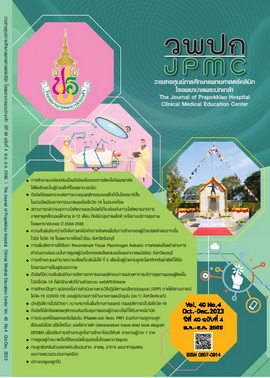Factors Related to the Behavioral Control of ADHD Children during the Covid-19 Lockdown in Thailand
Main Article Content
Abstract
BACKGROUND: The COVID-19 pandemic had numerous significant effects on Thai children, especially in terms of emotional and behavioral aspects. Children with ADHD, particularly those with issues concerning self-regulation, were more prone to negative effects than other children in the same age range.
OBJECTIVE: To identify potential factors that impacted the behavior of children with ADHD during the COVID-19 lockdown.
METHODS: The study utilized a cross-sectional research design. Sample sizes were selected by convenient sampling, and online questionnaires were used to collect data from caregivers of 6 to 15-year-old children treated by the Pediatric Outpatient Department of Burapha University Hospital between October 5, 2022 and January 15, 2023. The factors were analyzed by linear regression.
RESULTS: A sample size of 150 participants was divided into 30 caregivers of children with ADHD and 120 caregivers of children without ADHD. Factors that had a positive effect on the behavior of ADHD children consisted of online learning by doing worksheets and study time less than 6 hours per day. Furthermore, ADHD children who had the ability to concentrate for more than 40 minutes per subject demonstrated better behavior.
CONCLUSIONS: The COVID-19 lockdown situation could have had negative effects on children, especially ADHD children. The implementation of online teaching by doing worksheets for less than 40 minutes per subject and less than 6 hours per day could improve children’s behavior despite a lockdown situation.
Article Details

This work is licensed under a Creative Commons Attribution-NonCommercial-NoDerivatives 4.0 International License.
References
Visanuyothin T, Pavasuthipaisit C, Wachiradilok P, Arunruang P, Buranasuksakul T. The prevalence of attention deficit/hyperactivity disorder in Thailand. Journal of Mental Health of Thailand 2013; 21(2):66-75.
Xiang M, Zhang Z, Kuwahara K. Impact of COVID-19 pandemic on children and adolescents' lifestyle behavior larger than expected. Prog Cardiovasc Dis 2020;63:531-2.
Kovacs VA, Starc G, Brandes M, Kaj M, Blagus R, Leskošek B, et al. Physical activity, screen time and the COVID-19 school closures in Europe – an observational study in 10 countries. Eur J Sport Sci 2022;22:1094-103.
Jiao WY, Wang LN, Liu J, Fang SF, Jiao FY, Pettoello-Mantovani M, et al. Behavioral and emotional disorders in children during the COVID-19 epidemic. J Pediatr 2020;221:64-6.
Cortese S, Asherson P, Sonuga-Barke E, Banaschewski T, Brandeis D, Buitelaar J, et al. ADHD management during the COVID-19 pandemic: guidance from the European ADHD guidelines group. Lancet Child Adolesc Health 2020;4:412-4.
Sriwaranun T, Sittanomai N, Chantaratin S, Boon-Yasidhi V. The relationship between screen time and symptom severity in children with ADHD during COVID-19 lockdown. J Atten Disord 2023:27:973-8.
Behrmann JT, Blaabjerg J, Jordansen J, Jensen de López KM. Systematic review: Investigating the Impact of COVID-19 on Mental Health Outcomes of Individuals With ADHD. J Atten Disord 2022;26:959-75.
Melegari MG, Giallonardo M, Sacco R, Marcucci L, Orecchio S, Bruni O. Identifying the impact of the confinement of Covid-19 on emotional-mood and behavioural dimensions in children and adolescents with attention deficit hyperactivity disorder (ADHD). Psychiatry Res [Internet]. 2021 [cited 2023 Apr 14]; 296:113692. Available from: https://www.ncbi.nlm.nih.gov/pmc/articles/PMC7770476/pdf/main.pdf
Shah R, Raju VV, Sharma A, Grover S. Impact of COVID-19 and Lockdown on Children with ADHD and Their Families-An Online Survey and a Continuity Care Model. J Neurosci Rural Pract 2021;12:71-9.
Trangkasombat U. Clinical characteristics of ADHD in Thai children. J Med Assoc Thai 2008; 91:1894-8.
Sakboonyarat B, Chokcharoensap K, Sathuthum N, Chutchawalanon S, Khamkaen C, Sookkaew W, et al. Prevalence and Associated Factors of Attention Deficit Hyperactivity Disorder (ADHD) in a rural community, Central Thailand: A Mixed Methods Study. Global Journal of Health Science. 2018;10(3):60-9.
Thorell LB, Skoglund C, de la Peña AG, Baeyens D, Fuermaier ABM, Groom MJ, et al. Parental experiences of homeschooling during the COVID-19 pandemic: differences between seven European countries and between children with and without mental health conditions. Eur Child Adolesc Psychiatry 2022;31:649-61.

